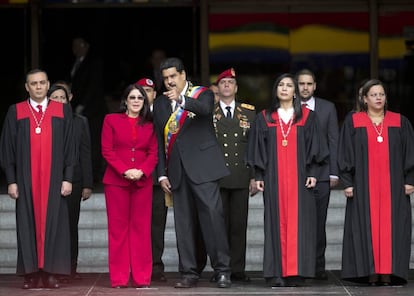A coup in Venezuela
Nicolás Maduro has consolidated a dictatorship

The stripping of the Venezuela National Assembly’s lawmaking powers, their transfer to the Supreme Court of Justice – controlled by the chavistas (as the followers of former president Hugo Chávez are known) – and President Nicolás Maduro’s own assumption of extraordinary powers on criminal, military, social, political and civil matters all represent an institutional blow of extreme gravity, unmatched since Venezuela’s institutional crisis began. It is a veritable coup that leaves no room for nuance of any kind.
In a continent where democracy has made spectacular progress after finally leaving behind the regimes of the 1970s and 1980s, Venezuela’s regression into a dictatorship is incredibly sad news; it also casts worrying shadows over the future of a country that in no way deserves to be left on the sidelines of the system of liberties that is happily the majority system in the region.
Today Venezuela is a country that is isolated from its neighbors
The National Assembly is the legitimate legislative body according to the Venezuelan Constitution – designed and promoted by Chávez himself – and it was democratically elected for the last time at the December 2015 elections. As president, Maduro is under the obligation not only to accept the outcome, which gave a landslide victory to the opposition, but to collaborate with this chamber at the institutional level, for the good of Venezuela and for purposes of governability.
But the Venezuelan leader has done nothing of the kind: instead, he has tried to bypass the law from day one, employing all manner of ruses. These included a phantasmagorical alternative parliament, and budget approval without considering the chamber’s opinion on the matter. Finally, he ordered the judiciary, which is completely controlled by chavista loyalists, to initiate a process that was legally indefensible and ended with a complete disabling of the parliament. This is inconceivable in any country wishing to be internationally recognized as a democracy.
Against this backdrop, the extremely harsh statements by the secretary general of the Organization of American States, (OAS), Luis Almagro, can come as no surprise; neither can the OAS’s report demanding new elections. In Almagro’s own words: “The way out of a dictatorship is through elections.”
The way out of a dictatorship is through elections
Luis Almagro, OAS
The break with constitutional order encouraged by Maduro and his people represents an extremely dangerous point of no return in the fracture that chavismo has created in Venezuela. Despite the repeated calls for calm and dialogue issued for months by prominent individuals and international bodies, and despite the Vatican’s mediation attempt, Maduro has stubbornly refused to meet even the minimum requirements that would facilitate the search for common ground, and instead has accelerated his resistance against the law. This strategy ended with the coup of last Wednesday.
Today Venezuela is a country that is isolated from its neighbors, a country where there are political prisoners, where the opposition is being persecuted, where parliament has been suspended and the economy has been ravaged. This is the true legacy of Nicolás Maduro and chavismo. It is something that Venezuelans do not deserve, because as the OAS notes, they cannot be denied the right to elect their leaders in free elections.
English version by Susana Urra.
Tu suscripción se está usando en otro dispositivo
¿Quieres añadir otro usuario a tu suscripción?
Si continúas leyendo en este dispositivo, no se podrá leer en el otro.
FlechaTu suscripción se está usando en otro dispositivo y solo puedes acceder a EL PAÍS desde un dispositivo a la vez.
Si quieres compartir tu cuenta, cambia tu suscripción a la modalidad Premium, así podrás añadir otro usuario. Cada uno accederá con su propia cuenta de email, lo que os permitirá personalizar vuestra experiencia en EL PAÍS.
¿Tienes una suscripción de empresa? Accede aquí para contratar más cuentas.
En el caso de no saber quién está usando tu cuenta, te recomendamos cambiar tu contraseña aquí.
Si decides continuar compartiendo tu cuenta, este mensaje se mostrará en tu dispositivo y en el de la otra persona que está usando tu cuenta de forma indefinida, afectando a tu experiencia de lectura. Puedes consultar aquí los términos y condiciones de la suscripción digital.








































